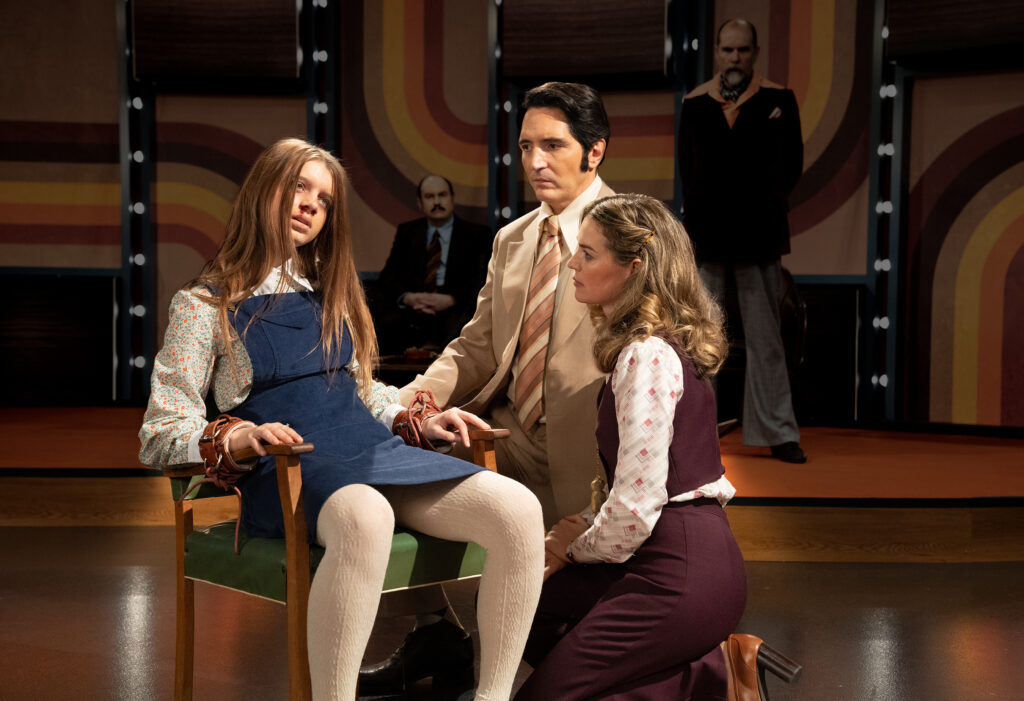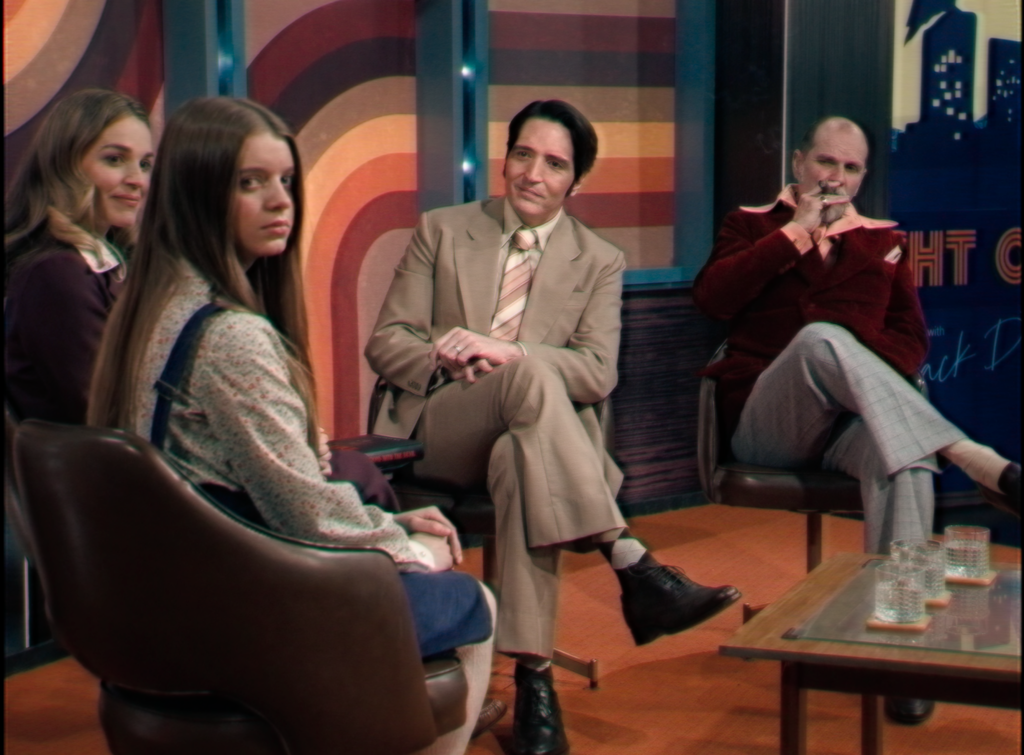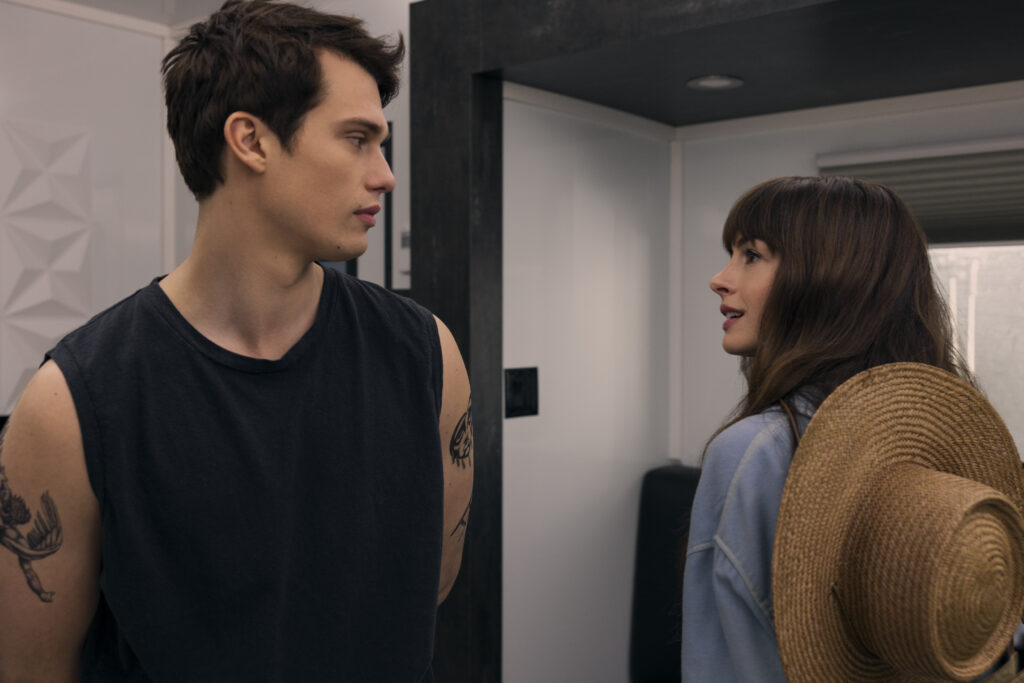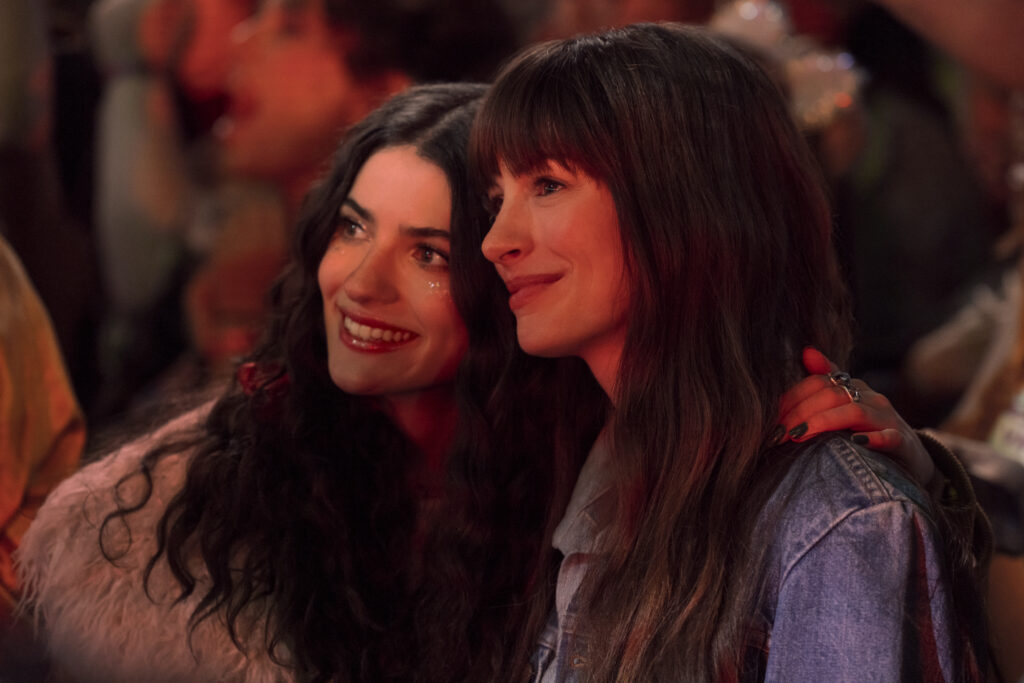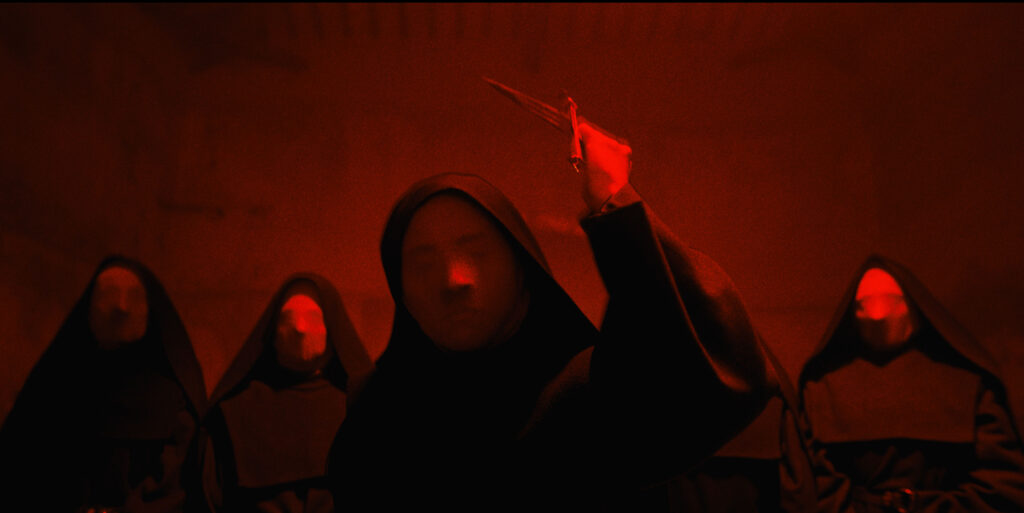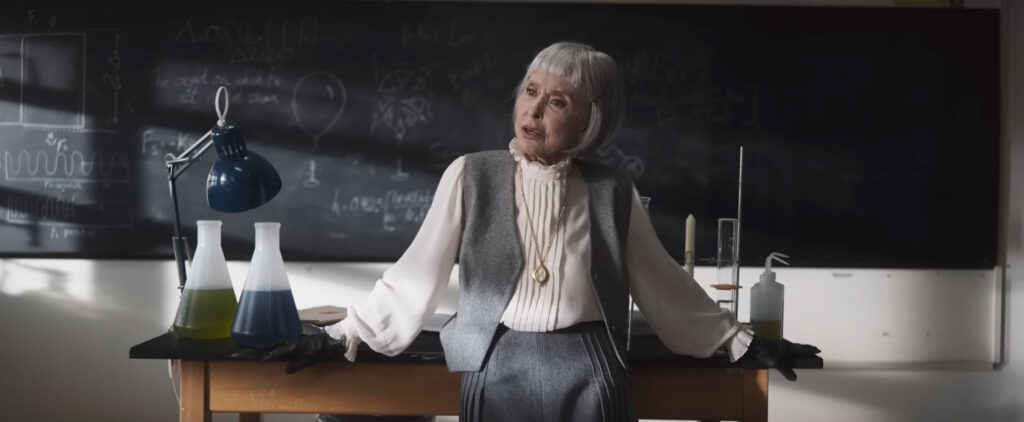June 2, 2024
by Carla Hay

Directed by Muta’Ali
Culture Representation: The documentary film “MoviePass, MovieCrash” features a predominantly white group of people (with some black people) discussing the rise, the fall and the attempted comeback of MoviePass, a subscription service for movie tickets.
Culture Clash: MoviePass struggled for years to become a popular company, until a controversial management team took over and made radical business decisions that rapidly increased subscribers, but the company crashed and burned due to overspending and extreme financial losses.
Culture Audience: “MoviePass, MovieCrash” will appeal primarily to people who are moviegoers, entrepreneurs or business investors and are interested in watching documentaries about how greed and arrogance can ruin businesses.

The documentary “MoviePass, MovieCrash” (directed by Muta’Ali, also known as Muta’Ali Muhammad) offers some interesting behind-the-scenes perspectives of the rise, fall and attempted comeback of MoviePass, the first popular subscription service for movie tickets in the United States. The film editing brings some comedic touches to a harsh business story. Because so much of what happened to MoviePass has been widely reported elsewhere, not much is surprising in this documentary, and there are glaring omissions.
For example, “MoviePass, MovieCrash” does not mention AMC Theatres’ subscription service AMC Stubs A-List, which launched in June 2018 as an extension of the already existing AMC Stubs rewards program. AMC Stubs A-List was one of the biggest factors in the downfall of MoviePass in 2018. And although “MoviePass, MovieCrash” gives some commentary on the apparent racism behind white executives sidelining and eventually ousting MoviePass co-founders Stacy Spikes and Hamet Watt (who are both African American), there’s no mention of the obvious sexism at MoviePass. At the peak of MoviePass’ popularity, all of the company’s top executives and board of directors consisted of men. “MoviePass, MovieCrash” had its world premiere at the 2024 SXSW Film & TV Festival.
“MoviePass, MovieCrash” tells the company’s story in mostly chronological order, featuring interviews with Spikes and many of the company’s former employees, investors and subscribers. Headquartered in New York City, MoviePass was founded in 2011 and didn’t become a profitable company until 2023. Before co-founding MoviePass, Spikes (who was born and raised in Houston) had experiences in the 1990s as a marketing executive at Miramax and as a product manager at Motown Records. In 1997, Spikes founded the Urbanworld Film Festival as a showcase for filmmakers of color. Watt’s previous experience was as an entrepreneur of various small businesses.
According to what Spikes says in the documentary, MoviePass was originally conceived as a subscription service version of the Urbanworld Film Festival. The idea for MoviePass morphed from not just being limited to one film festival but to being a nationwide service for movie ticketing at corporate-owned and independently owned movie theaters. These movie theaters would get a cut of the revenue from tickets purchased through MoviePass.
The MoviePass business model was that subscribers would pay a monthly fee to watch a certain number of movies per month at a wide selection of movie theaters. One of the original MoviePass subscription plans was $39.95 for 30 movies a month, with a limit of one movie per day. Tickets could be booked on a MoviePass app, and a MoviePass card that operated like a debit card would redeem the tickets at participating movie theaters.
However, it was difficult for this business model to be profitable, as long as numerous subscribers were frequent moviegoers and paying only a fraction of what they would pay for tickets without this MoviePass subscription. In other words, MoviePass was losing money from all the ticket discounts that MoviePass subscribers were getting from these subscriptions. MoviePass did not have any other source of sales revenue to offset these financial losses, and the company had to rely on investors to keep MoviePass in business.
From 2011 to 2016, Spikes was the CEO of MoviePass, while Watt was the board chairman who mostly dealt with finding investors. The company’s biggest problem during this time period was that the subscriber base stalled somewhere around 20,000 subscribers. Another big setback was that MoviePass temporarily lost a business deal with Movietickets.com (partially owned by AMC Theatres) in 2015, when Adam Aron replaced Gerry Lopez as CEO of AMC Theatres. Lopez is interviewed in the documentary, while Aron is not. Lopez says that MoviePass was beneficial to AMC Theatres in the early-to-mid-2010s.
One of the original major investors in MoviePass was Chris Kelly, a former Facebook executive who briefly dabbled in politics. (In 2010, Kelly lost the California district attorney’s Democratic primary to Kamala Harris.) As a major investor in MoviePass, Kelly also became a member of MoviePass’ board of directors. Because he invested so much money in MoviePass, Kelly was eventually given two seats on the board. Kelly, who is interviewed in the documentary, says that there came a point in time when he had no more money that he could invest in MoviePass, so he urged Spikes and Watt to find other big-money investors.
Mitch Lowe, a former executive for Redbox and Netflix, joined MoviePass in 2016 as CEO and as a board member. Spikes was made chief operating officer (COO) under this new management structure, while Watt began to be sidelined. In the documentary, Lowe openly admits that he didn’t think Watt was as valuable as Spikes to MoviePass at the time.
On the recommendation of Lowe, a big-talking executive named Ted Farnsworth (who was CEO of analytics firm Helios and Matheson at the time) was brought to MoviePass as a chief investor. Farnsworth had a background in finance, public relations and marketing with several start-up companies. Farnsworth told the MoviePass executives that MoviePass couldn’t be profitable until MoviePass had at least 1 million subscribers. Spikes says in the documentary that he constantly raised concerns to Lowe, Farnsworth and other MoviePass board members about the sustainability of this goal.
Spikes says Farnsworth and Lowe repeatedly dismissed Spikes’ warnings that MoviePass’ financial losses would become too large to handle with more than 1 million subscribers, unless MoviePass figured out a way for the company to become profitable. There was also the issue of MoviePass being understaffed and unable to keep up with any rapid increase in subscribers. Lowe’s reaction was to act like Spikes was being negative and difficult: “He was not being a constructive member of the team,” Lowe says in the documentary about Spikes.
In the documentary, Spikes uses an airplane analogy to explain MoviePass’ rapid growth plans: “We’re kind of learning to build the plane mid-flight. And changing it from a crop duster to a 747 that can handle large volumes of people. We were not prepared to keep running at that pace.” Spikes says his recommendation to “put the brakes” on MoviePass’ plan for rapid growth was often ignored.
Lowe wanted MoviePass to quickly reach the goal of 1 million subscribers and get a lot of media attention for it. Lowe takes full credit in the documentary for coming up with the idea of reducing the MoviePass subscription price to $9.95 per month, which would still give subscribers a “pass” to see one movie every day at participating theaters. And sure enough, MoviePass had a meteoric increase in subscribers and got a lot of media attention from late 2017 through all of 2018. By then, Spikes and Watt had been pushed out of the company.
In August 2017, Helios and Matheson bought a majority stake in MoviePass. Spikes and Watt were removed from MoviePass’ board of directors and forced out of the company. Spikes and Watt got to keep their stock shares in MoviePass after they were fired from the company. However, under the terms of their exit deal, Spikes and Watt could not buy or sell these shares for a 12-month period after being dismissed from MoviePass. According to Spikes, his shares in MoviePass were worth about $80 million when he was ousted from MoviePass in 2017. A year later, those shares would essentially be worthless.
MoviePass’ rapid rise and fall have been well-documented in the media and elsewhere. By December 2017, MoviePass had 1 million subscribers. By February 2018, MoviePass had 2 million subscribers. By June 2018, MoviePass had 3 million subscribers. Lowe and Farnsworth became the new faces of MoviePass, with many media outlets incorrectly identifying Lowe and Farnsworth as the founders of MoviePass. Lowe and Farnsworth soaked up all the publicity they were getting for being “visionary” leaders of a “hot” company that was a popular choice for stock investors.
Still, the question remained: How was MoviePass going to actually become profitable? In media interviews, Farnsworth and Lowe kept saying that MoviePass was planning to sell its customer data to movie studios. However, they avoided answering questions on how much this data was actually worth to make up for the hundreds of millions of dollars that MoviePass was losing.
Meanwhile, MoviePass went on a spending spree. The company spent millions on promoting MoviePass at major film festivals and other events. According to the documentary, MoviePass reportedly spent $1 million at the 2018 Coachella Valley Music and Arts Festival and hired mismatched spokespeople—such as former basketball star Dennis Rodman and social media influencer OK Bunny—to promote MoviePass at the festival. OK Bunny is interviewed in the documentary, and she still seems a little confused by what MoviePass was doing at Coachella and why she was paired with Rodman.
There were other ill-conceived business decisions, such as MoviePass Ventures and production company MoviePass Films, which invested heavily in the 2018 flop biopic “Gotti,” starring John Travolta as notorious Mafia boss John Gotti. Lowe says that MoviePass thought that its subscriber base would be the most likely to buy tickets to any movies that MoviePass produced. The failure of “Gotti” proved that business theory wrong. MoviePass also purchased the outdated Moviefone, a financially declining company for movie tickets and showtimes.
There were helicopters and private jets bearing the MoviePass logo. And several people in the documentary say that Lowe and especially Farnsworth were caught up in acting like “rock star” executives who wanted to party with celebrities. Lowe doesn’t deny any of it and makes this excuse for why he and other high-ranking MoviePass executives got the biggest perks from the spending sprees, while the lower-level employees were overworked and understaffed: “Not all roles get to party.”
Farnsworth is not interviewed in “MoviePass, MovieCrash,” which depicts Farnsworth as the story’s biggest villain and a prime example of callous corporate greed. There is no mention in the documentary if the “MoviePass, Movie Crash” filmmakers attempted to interview him, or if Farnsworth declined any requests for comment. It’s mentioned in the documentary that Farnsworth abused his power at MoviePass to make nepotism hires of family members and friends who were inexperienced or unqualified.
One of these nepotism hires was Robert “Bob” Ellis (Diana Ross’ first ex-husband), who is mentioned but not interviewed in the documentary. Ellis, who was put on MoviePass’ payroll as a marketing consultant, is described as a Hollywood hanger-on, photographer and close friend of Farnsworth. He was part of the MoviePass executive clique that went on luxury trips that were paid for by the company.
Also mentioned but not interviewed in the documentary is Khalid Itum, an inexperienced MoviePass employee who quickly rose through the company ranks and eventually became MoviePass’ vice president of business development. Itum is named as one of the biggest offenders in the wild spending sprees at MoviePass. The documentary includes some audio clips of recordings of MoviePass staff meetings. In these recordings, Itum and Lowe seem to be willfully in denial about how their overspending was very damaging to MoviePass.
in July 2018, during the weekend that “Mission: Impossible – Fallout” was released in theaters, MoviePass crashed and burned when the MoviePass app stopped working or had limitations for most of its customers. MoviePass frequently switched its terms of service without giving customers proper notice. Subscribers complained of not getting responses from MoviePass customer service representatives. These problems continued for the next several months. The widespread customer complaints and several lawsuits against MoviePass led to the Federal Trade Commission (FTC) investigating MoviePass for fraud.
Daniel Kaufman, the former FTC director who was involved in these MoviePass investigations, describes Farnsworth as a con man who didn’t really know how to operate a business but only knew how to promote a business. Journalists/reporters Nathan McAlone and Jason Guerrasio, who both covered the MoviePass saga for the website Business Insider, also describe Farnsworth as the worse person in the toxic duo of Farnsworth and Lowe. Business Insider is listed in the documentary’s end credits as a production collaborator for “MoviePass, MovieCrash.”
As for Lowe, he doesn’t take much personal responsibility for MoviePass’ downfall. Lowe shifts almost all of the blame on bad advice that he got from Farnsworth. In the documentary, Lowe says that when things came crashing down for MoviePass, Farnsworth told Lowe: “Just keep going and the money will come.” MoviePass’ bankruptcy and closure in 2019, as well as MoviePass’ revival by Spikes (who bought back the rights to MoviePass in 2021 and returned to the company as CEO), are briefly mentioned toward the end of the documentary. The MoviePass legal problems of Lowe, Farnsworth and Itum are in the documentary’s epilogue.
“MoviePass, MovieCrash” has interviews with former MoviePass customer service employees Sydney Weinshel, Emmanuel Freeman and Ezekiel Sansing; former MoviePass engineer Oscar Miscar; former MoviePass social media manager Drew Taylor; former Helios and Matheson public relations executive Mark Havener; former Urbanworld Film Festival director Gabrielle Glore; and former MoviePass subscribers Mat Levy, Jose Rolden and James Simermeyer. Also interviewed are several investors (some of whom were MoviePass investors, while some were not), such as Mark Gomes, John Fitchthorn, Ken Gardner, Ben Rabizadeh, Daymond John and Guy Primus.
The former MoviePass employees describe feeling optimistic and excited when they first joined the company, but that excitement soon turned to dread and discontent when they saw how things were being grossly mismanaged. Lower-lever staffers were overwhelmed with customer complaints, while MoviePass’ upper-level executives were living lavish lifestyles and denying that big problems existed at MoviePass. Miscar is the former MoviePass employee who is the most candid in the documentary interviews and is the only former MoviePass employee to call out the problematic racial issues in how Spikes and Watt were pushed out of MoviePass by an all-white team of executives.
Spikes and Watt are diplomatic when talking about their humiliating exits from MoviePass. Watt emphatically states that MoviePass is in his past, and he’s happy to have moved on to other things. (He’s an investor consultant.) By contrast, Spikes is still very clearly haunted by the demise of MoviePass from 2018 to 2019, and he is determined to make the company even bigger and better than it ever was. Spikes mentions he was partially inspired to revive MoviePass by how Apple Inc. co-founder Steve Jobs and Dell Technologies founder Michael Dell were ousted from the companies they founded and made big comebacks when they returned to those companies.
“MoviePass, Movie Crash” uses a lot of clips from movies and TV shows as ways to put an emphasis on the emotions and reactions being described in the documentary. This editing brings some amusing entertainment to an otherwise infuriating story about corporate corruption. Spikes mentions that if he and Watt had been running MoviePass in the same the way that Lowe and Farnsworth ran the company into the ground, then Spikes and Watt would’ve gotten quicker and harsher legal consequences.
There is some mention in the documentary about these racial inequalities for entrepreneurs, with the obvious fact that white men get the vast majority of investment money. Watt says in the documentary that a start-up company such as MoviePass needed this factor to take the company to the next level: “If you have a white man with more gray hair that could inspire other white males with white hair to be more comfortable investing. It’s a factor we considered through the entire entrepreneurial journey.”
Lowe and Farnsworth certainly took MoviePass to the “next level,” but at what cost? The MoviePass brand name and reputation became permanently tarnished. Millions of dollars were lost. Untold numbers of people felt ripped off and cheated by MoviePass. And certain people got into big legal trouble over how MoviePass was mishandled.
The racial implications of MoviePass’ history are certainly acknowledged in the documentary. However, there’s no good reason for the noticeably low number of women interviewed for this documentary. Studies from the Motion Picture Association and other sources have shown for years that women are about 51% of the movie ticket buyers in the United States, and females are about 51% of moviegoers. And yet, there are no female MoviePass subscribers interviewed in this documentary. (A social media clip of a random female former MoviePass subscriber talking about MoviePass is not the same thing as an interview.)
The very real problem of sexism is completely ignored in “MoviePass, MovieCrash,” which comes across as very much like a “boys’ club” documentary without including the realities of how women have a big impact on movie ticket buying. The “MoviePass, MovieCrash” filmmakers also never question why women were excluded from being MoviePass’ highest-ranking leaders. The documentary’s biggest flaw is failing to mention these issues regarding gender and sexism. However, “MoviePass, MovieCrash” does a sufficient job of answering this question for anyone who is curious: “Whatever happened to MoviePass?”
HBO premiered “MoviePass, MovieCrash” on May 29, 2024.









